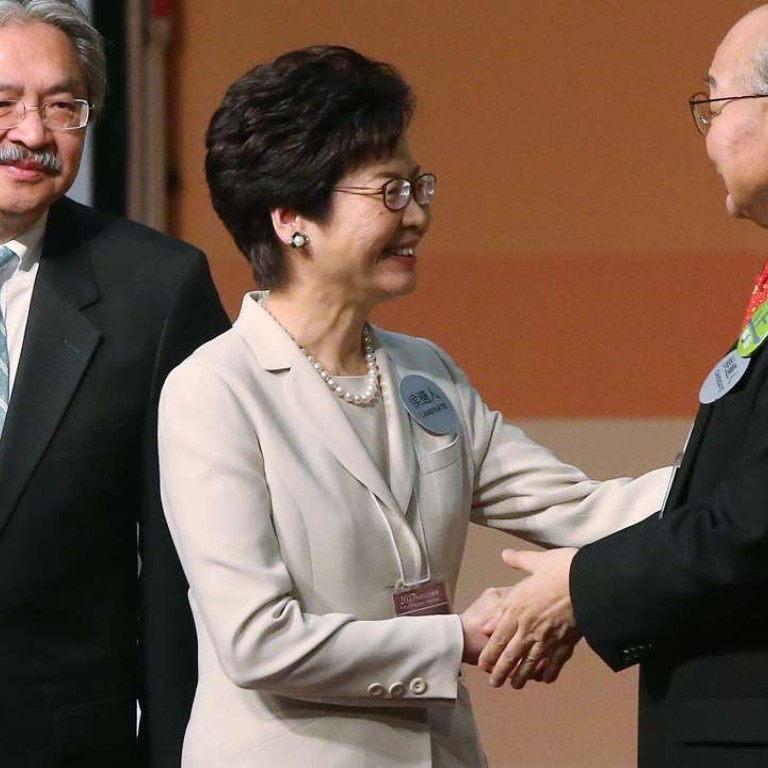
Letters to the Editor, April 11, 2017
Beijing the real power broker in Hong Kong
It violates the principles of “one country, two systems” and “Hong Kong people governing Hong Kong”, as almost everything is decided by Beijing and a small-circle election by about 1,200 people.
They are not representative of the community as a whole. The election is a mere formality. The central government’s liaison office interferes indirectly right from the beginning of the electoral process.
I feel that we are really like another province of the mainland. When we have a rising budget surplus, we are expected to spend some of it on projects that will help the mainland economy, such as the high-speed rail link to Guangzhou and the Hong Kong-Zhuhai-Macau bridge.
We have seen little in the way of political reforms that could lead us closer to a real democratic development. The central government is slow to react to any Hong Kong problems that are brought to its attention.
I do not believe that Beijing has said or done anything that has benefited Hong Kong.
Carrie Lam Cheng Yuet-ngor will sail in two boats after she takes over as chief executive on July 1. She is facing a hard task forming a cabinet, and she will find it difficult to attract people of genuine talent.
She pledges to try to live up to the expectations of the central government and at the same time talks about trying to unify the people of Hong Kong.
I don’t expect much progress in the area of political reforms. Rather, legislation relating to Article 23 is likely to be debated in the Legislative Council chamber in the near future. It may be introduced in segments, so the public does not notice what is happening. However, I still think Hong Kong will progress and the economy will regenerate. We are lucky to have an experienced and well-trained civil service. I wish Carrie Lam good luck.
A. L. Nanik, Tsim Sha Tsui
Inviting teams from former colonial power
The irony of this proposal is not lost on me.
Jason Ali, Lantau
Trump’s coal plan ignores climate change
Part of US President Donald Trump’s plan to put Americans back to work is to revive the coal industry. This will mean more miners go underground again, more will get black lung disease, go to doctors for treatment and boost the health care sector.
I believe this blatant turning of a deaf ear towards climate change will not “Make America great again”. It will however “Make America irate again”.
Herb Stark, Mooresville, North Carolina, US
Excessive use of smartphone is dangerous
No matter which country you visit, you see people walking with smartphones in their hand. Wherever they are, they will have the phone and this has raised concerns about smartphone addiction.
When individuals spend inordinate amounts of time on social media and playing online games, it can have negative consequences. They spend less time interacting with others.
If someone is repeatedly checking texts, emails, news feeds, websites or apps, even when it is encroaching on their lives, it may be time for them to reassess their use of technology.
This sort of compulsive behaviour can be seen as a form of addiction, and it has serious side effects. It can lead to feelings of isolation and depression.
Smartphone addiction can also exacerbate attention deficit disorder. If people constantly look at messages on a smartphone, it can make it difficult for them to focus on anything for more than a few minutes .
Those who tend to spend too much time on smartphones must modify mobile use before this gets out of hand. They could schedule its use for specific times of the day. For example, students should decide only to switch their phone on after they finish a homework assignment.
With the right attitude, it is possible to avoid smartphone addiction.
Benson Wong Tat-hin, Tseung Kwan O
Concerns over environment are snubbed
We are seeing more protests in Hong Kong and it appears that many citizens have lost trust in the government. Therefore they take to the streets, believing this is the best way to get the attention of our leaders.
However, are they listening? Concerns about threats to the environment were raised when it was proposed to build the third runway at the airport and the Hong Kong-Zhuhai-Macau bridge. In particular, people were concerned about the fate of the Chinese white dolphins and the effect on their habitat.
The Hong Kong government allowed both projects to go ahead and dolphin numbers have continued to decline.
It makes me wonder if leaders do ever listen to citizens. They should pay heed to public concerns about the environment. If they continue to ignore the views of Hongkongers, we will see more protests.
Oscar Au Yeung, Po Lam

